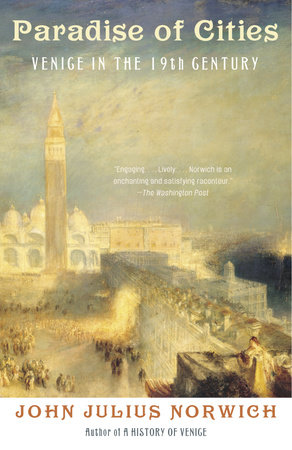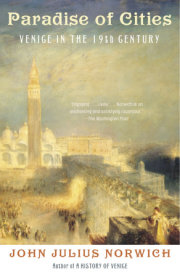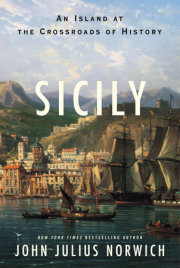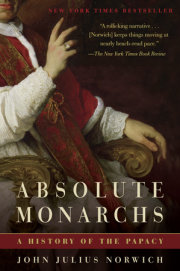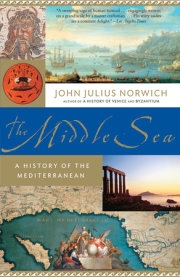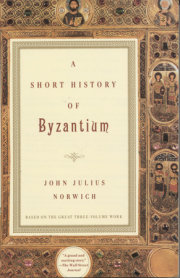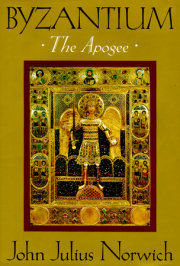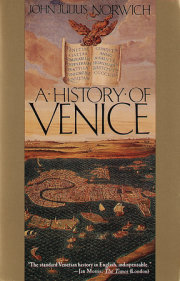Chapter I
After the Fall
[1797-1799]
What will happen now to the city of Venice? This city could exist in all its wealth, splendour and beauty only when a capital, inhabited by the aristocracy who governed the Republic. When you are all gone, you patricians, to live on the mainland, Venice will waste away. And is it not true that you are leaving? What would you do in Venice, when you have nothing to do?
giacomo casanova to pietro zaguri
4 December 1797
Sometime in November 1798, Lorenzo da Ponte, Mozart's greatest librettist and a former Jesuit priest, arrived in Venice for the first time since he had been expelled from the city for gross immorality, nineteen years before. He tells in his memoirs of how he entered St. Mark's Square under the clock tower, and of his horror at what he saw. "My reader will judge," he wrote, "my surprise and grief, when in all that vast space, where in happy times nothing is to be seen but a great concourse of gay and contented people, I myself saw on every side only melancholy, silence, solitude and desolation. . . . There were only seven people when I entered the Piazza. . . . Even the cafes were empty."
It was no wonder. Just eighteen months before, threatened by the young Napoleon Bonaparte at the culmination of his triumphant campaign across Italy, the Venetian Republic had come to an end. It had lasted, by the most conservative reckoning, for 1,070 years--a period of time comfortably longer than that which separates Queen Elizabeth II from William the Conqueror--and the Venetians were still in a state of shock. Many of them also felt no small degree of shame; for they themselves, as they were well aware, had been largely responsible for the speed and suddenness of their collapse. Venice had long since lost the last vestiges of her former greatness, and even of the respect which, in former days, she had enjoyed throughout Europe and beyond. Her commercial supremacy--the source of all her wealth--had failed to survive the discovery of the Cape route to the Indies, which had gradually reduced the Middle Sea to a backwater. Moreover the relentless advance of the Ottoman Turks, both before and after the capture of Constantinople by Sultan Mehmet II in 1453, had led to the annihilation, one by one, of her trading colonies in the Near East. Cyprus had fallen in August 1571. Nine weeks later Venice, Spain, and the Papacy had admittedly scored a spectacular victory over the Turks at Lepanto--the last sea battle in history to be fought by oared galleys--but even this engagement, though it provided a temporary boost to flagging Western morale, had had little long-term result; and the fall of Crete in 1669, after a siege lasting twenty-two years, had effectively put an end to Venice's imperial ambitions in the eastern Mediterranean. True, the Venetians had fought back and, in the century's last quarter, had even managed briefly to regain a few of their former possessions (scoring, as they did so, a direct hit on the Parthenon); but by 1718, when their frontiers were drawn for the last time, they found themselves--apart from their provinces on the Italian terra firma--with only Istria and Dalmatia, northern Albania and the Ionian islands, and finally, south of the Peloponnese, the little island of Cythera.
Then, in the early eighteenth century--whether by accident or design remains uncertain--the Most Serene Republic set itself upon a completely different course. It assumed the mantle of the pleasure capital of Europe--and in doing so, during the final decades of its existence, set in train a dramatic revival of financial prosperity. This, fortunately, was the age of the Grand Tour. From all over northern and western Europe--but above all from England--young noblemen descended on Italy with the ostensible purpose of completing their education. Rome, inevitably, was their principal objective, with all the opportunities it offered for the study of the great monuments of antiquity; but there were few indeed who did not return by way of Venice, where Carnival lasted longer, the gambling was for higher stakes, and the courtesans were more obliging and highly skilled than anywhere else on the continent. For those visitors of more intellectual tastes, there were books, pictures, and sculptures to be bought, and churches and palaces to be admired, to say nothing of the music and opera for which Venice was famous throughout the civilized world. The city was the most comfortable in Italy, and by far the most beautiful; and by a further lucky coincidence it boasted a number of hugely talented men who in the past fifty years had brought the art of townscape painting to a point of excellence never achieved before or since. It was fortunate too that the greatest of these vedutisti, Antonio Canal--generally known as Canaletto--should have selected as his agent an Englishman, a certain Joseph Smith, who had come to Venice in 1700 at the age of eighteen and was to remain there till his death, seventy years later. In 1742 Smith was appointed British Consul, in which capacity he was careful to make the acquaintance of all the richer Englishmen passing through the city--and to ensure that they all received an invitation to the Master's studio. Thus it was that when--somewhat wiser and a good deal poorer--the young milords eventually returned to their homeland, a mild dose of the clap must have seemed a small price to pay for a brace of Canalettos and the memories of the happiest and most exciting weeks of their lives.
Smith was a remarkable man, one of the leading figures of eighteenth-century Venice. Canaletto was not his only client: he also negotiated sales on behalf of Marco and Sebastiano Ricci, of Francesco Zuccarelli, and of the greatest portraitist in pastel who ever lived, Rosalba Carriera. We can only regret that, living though he did among artists, none of them ever painted his likeness; among his Venetian contemporaries there are few men of his distinction of whose appearance we know so little. The dedicatee of Canaletto's only published set of engravings, he was himself an avid collector. In 1762 he sold his complete collection of pictures and objets d'art to George III for lira 20,000; and when, three years later, the King followed this tremendous purchase with another, buying all the Consul's books and manuscripts en bloc for lira 10,000, he laid the foundations for the British Library as we know it today. With the proceeds Smith immediately began a new collection--he was then eighty-three--which by his death, five years later, had grown to such a size that its own sale took thirteen days.
When Consul Smith died in 1770, the Republic had just over a quarter of a century to live. It was still putting on a brave show. The future Tsar Paul I and his wife--traveling under the romantic aliases of Count and Countess of the North--paid a visit in January 1782, and the celebrations in their honor were as lavish as ever: on one evening during their stay, a touch from the hand of the Countess was enough to set a huge artificial dove speeding around the Piazza, sparking off a hundred torches as it went, and finally coming to rest on an eighty-foot-high replica of the Arch of Titus in Rome. But the fabric of the state was crumbling, and all thinking Venetians knew it.
The root of the problem, whatever it might be, was certainly not economic. With no wars fought since 1718, with trade flourishing, and with a constant flood of well-heeled visitors pouring into the city, Venice was enjoying a period of unusual commercial prosperity and economic growth. Her citizens--some 160,000 of them--were in all probability as happy and contented as they had ever been. What, then, had happened? Quite simply, she had lost her self-respect. No longer was she an international force to be reckoned with, no longer did she see herself as a significant player on the world stage. Her war fleet, that fleet which in former times had made her the unrivaled mistress of the Mediterranean, was now reduced to about twenty vessels; her menfolk, once famous across the oceans for their navigation and seamanship, were now better known as panders and procurers, gamblers and pimps. Dedicated now only to the relentless pursuit of pleasure--and to the purveying of that pleasure to others--Venice had neglected those very institutions which had made her great, and had perhaps even enabled her to survive: her naval and military strength and--arguably most important of all--her unique political structure.
Alone among the states of Europe, Venice by the mid-eighteenth century had maintained her constitution essentially unchanged for over a thousand years. Twice only--in 1310 and again in 1355--had it been threatened, and on both occasions the upheavals, such as they were, had been dealt with in a matter of hours. It was admittedly oligarchic: the vast majority of Venetians had always been without the franchise and had no say in the government of the Republic. Few, on the other hand, complained. The civil service was open to all; commerce and the craftsmanship for which the city was famous provided a source of pride and satisfaction as well as rich material rewards; and it was almost universally accepted that the government had the best interests of its citizens at heart.
But the body politic was not as healthy as it seemed. There was, first of all, the curious reluctance of the Venetian upper classes to marry. Of the fourteen Doges who reigned in the hundred years between 1675 and 1775, eleven were bachelors; and if we look at the aristocracy as a whole, much the same pattern is revealed--at the time of which we were speaking, well over 60 percent remained unattached. The underlying philosophy is clear: the family must continue, and it must continue rich. One son was therefore required to marry, and to beget enough legitimate male heirs to ensure the first of these requirements; the other sons would remain single, thus--by preventing the dispersal of wealth--fulfilling the second. This reluctance had two dangerous consequences. The first was that sometimes a carefully laid plan would go wrong; several old and distinguished families became extinct in this way; the second was that the nobility suffered from an ever-widening split between rich and poor. This in turn meant a dramatic increase in the so-called barnabotti, that class of impoverished noblemen who were too poor or too uneducated to occupy any but the lowest administrative positions, and whose dissatisfaction was growing steadily more vocal. In an effort to infuse new blood, seats on the Great Council--since 1298 exclusively reserved for those families whose names were at that time entered in the Golden Book--were now openly offered for sale to approved and suitably affluent outsiders; but this practice too showed itself to be deeply divisive. Doge Paolo Renier, who assumed the ducal throne on 14 January 1779, described the situation as well as anyone:
If any state has need of unity, it is ours. We have no forces, neither on land nor at sea. We have no alliances. We live by good fortune, by accident, putting our trust solely in that reputation for prudence that the government of Venice has always enjoyed. Here, and here only, lies our strength.
But prudence, too, seemed to be in short supply. Renier himself--who was married to a Greek tightrope walker--had a reputation for sharp practice and was commonly rumored to have bought the Dogeship by bribing three hundred members of the Great Council. Moreover he found himself pitted against unscrupulous political bosses who frequently wielded a good deal more real power than he did himself--violent reactionaries such as Andrea Tron, popularly known among Venetians as il Paron, or embittered barnabotti such as Giorgio Pisani, who openly accused the government of criminal mismanagement, decadence, and corruption. Such men in former centuries would have been unknown or--had they dared to raise their heads--would have been dealt with quietly and expeditiously by the government. By the 1770s, though the state still retained vestiges of its old authority--Pisani was finally arrested and imprisoned for ten years on the mainland--it had largely forfeited the respect of its citizens. This it would not regain.
Even when Venice's power was at its zenith, Napoleon would have been a formidable adversary; in her present condition she stood no chance against him. Her emissaries, Francesco Dona and Lunardo Giustinian, who followed him hotfoot across Italy and Austria and finally found him at Graz, were deceived by his bluster and horrified by his threat to be "an Attila to the state of Venice"; their report to the Doge and the Signoria only confirmed the general view that war was imminent, the Republic doomed. On Tuesday, 9 May 1797, Villetard, the French charge d'affaires, handed over an ultimatum demanding inter alia the establishment of a provisional municipality in place of the Republic, whose insignia was to be burnt at the foot of a Tree of Liberty erected in the center of the Piazza; and three days later the Great Council assembled in what was to be its final session, to consider this document. Soon afterwards shots were heard outside, and panic spread through the chamber. The source of the commotion proved to be nothing more than a few Dalmation soldiers who, expelled by the French, were discharging their muskets in a farewell salute to the city; but by now reassurances were useless and the debate was abandoned. Some--though by no means all--members of the Council were persuaded to delay their departure long enough to cast their votes; few, however, remained to hear the result. The resolution to accept the ultimatum was carried by 512 to 30, with 5 abstentions.
The 120th and last Doge of Venice, Lodovico Manin, made no attempt to flee. Almost alone among his fellow patricians, he had maintained a quiet calm amid the hubbub--a calm born, perhaps, of fatalism and despair, but a calm nonetheless that enabled him to keep his dignity, even while the last frail structure of the Republic crumbled about him. In the sudden stillness that followed the breakup of the meeting he slowly gathered up his papers and withdrew to his private apartments. There, having laid aside his ducal corno, he carefully untied the ribbons of the close-fitting cap of white linen always worn beneath it, the cuffietta, and handed it to his valet with those sad words which, more than any others, seem to symbolize the fall of Venice: "Tole, questa no la dopero piu"--"Take this, I shall not be needing it again."
The crowds who had gathered outside the Palace showed a good deal more spirit than their rulers. They had watched, astonished, the precipitate flight of the Council members from the building, and the news of the resolution spread quickly through the city. Within minutes the people were streaming from all sides into the Piazza, shouting, "Viva la Repubblica!" and "Viva San Marco!" sacking the houses of what they called the Jacobins and even the shop of a pork butcher in S. Moise who had been imprudent enough to display a pro-French poster. Only when the officer in charge of internal security, Bernardino Renier, had brought up a regiment of artillery to the Rialto Bridge and opened fire down the Grand Canal was order finally restored.
Copyright © 2003 by John Julius Norwich. All rights reserved. No part of this excerpt may be reproduced or reprinted without permission in writing from the publisher.

